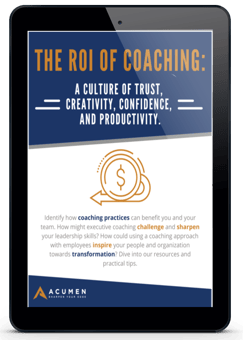Remember being a teenager? Think back to those turbulent, formative years. As you navigated the ups and downs of an increasingly-complicated life, who supported you? A parent, a teacher, or some other mentor? Chances are, that person didn’t position themselves as your boss – someone above you and tasked with doling out rigid instructions for you to follow exactly in order to achieve success. Chances are they positioned themselves as a coach – there to lend a compassionate listening ear, provide gentle nudges, and allow you to grow in your own way.
Now think back to your pre-leadership days as a professional. You probably walked out of a meeting with a corporate leader at least once thinking, “Wow, they sure had a lot to say. Now if only they’d heard what we had to say, some of those instructions and pieces of advice might have been helpful!”
Employees are certainly not angsty teenagers who you are responsible for nurturing. But there isn’t a human out there who wouldn’t prefer to be met with compassion, listening, and empowering guidance over a deaf ear and one-size-fits-all orders.
Corporate leaders across the globe are turning towards a coaching style of people management. Even the Harvard Business Review is hailing this approach as a core characteristic of good leaders, and it’s no mystery why. The numbers speak for themselves:
- 80% of people who receive coaching report increased self-confidence, and over 70% benefit from improved work performance, relationships, and communication skills.
- When organizational training is combined with one-on-one coaching, the increase in productivity rises from 22% to 88%.
The leader who functions as a coach – coming alongside their team with the primary goal of empowerment – will ultimately find themself with the more healthy and profitable organization every time.
Our newest ebook, The ROI of Coaching: A Culture of Trust, Creativity, Confidence, and Productivity, dives deeply into the research that supports the benefits of the coaching style of leadership. This may come as no surprise, but a company powered by confident, self-motivated employees will simply be more successful than one built on the backs of employees conditioned to look to the “big boss” for every decision!
The Kindness of Coaching
Likely, you’re here reading because you care about a bigger picture than the bottom line as a leader in your organization. Chances are, you measure your success at the end of the day less by the company’s value or quarterly revenue and more by the community impact – by the lives positively touched inside and outside your team.
So, put all the numbers aside, and put aside any logical argument for coaching as the superior, more profitable style of leadership. Take a moment to reflect on the Golden Rule, and ask yourself: what kind of leader do I want to be?
Did any of these words spring to mind?
- Compassionate
- Fair
- Empowering
- Wise
- Intentional
We’d like to argue that coaching practices can play a key role in enabling you to be the leader you are called to be.
The ROI of Coaching will walk you through:
- A deep dive into the nature of the coaching process.
- The benefits of executive coaching.
- The ROI of a business leader’s intentional utilization of coaching practices with their team.
- Practical tips and resources for starting YOUR process of moving towards a more collaborative and curious coaching approach.
Learn how to build your team’s creativity, confidence, and productivity using coaching practices.
Download The ROI of Coaching today.



Comments